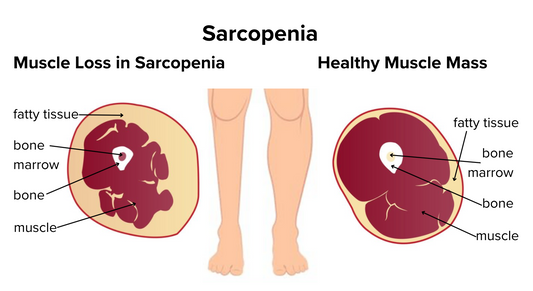As we voyage through the natural progression of aging, our bodies undergo various changes, one of which is the gradual loss of muscle mass, known as sarcopenia. This phenomenon is not just a cosmetic issue but a substantial health concern due to its metabolic implications.
Muscle is a metabolically active tissue, playing a pivotal role in regulating metabolic homeostasis. After the age of 35, most people start to lose as much as 1% of their muscle mass per year. By the time we hit our 60s and beyond, the rate of decline can accelerate, particularly in those who lead a sedentary lifestyle.
The repercussions of muscle atrophy extend beyond diminished strength and mobility. Muscles act as the body's primary glucose reservoir, with a direct impact on insulin sensitivity and glucose metabolism. A decline in muscle mass leads to a reduced metabolic rate, making it more challenging for the body to maintain normal blood sugar levels, potentially paving the way for insulin resistance and type 2 diabetes.
Furthermore, as our skeletal muscle diminishes, there's a tendency for the fat-to-muscle ratio to increase, even if body weight remains stable. This shift in body composition can contribute to metabolic syndrome, a cluster of conditions that increases the risk for heart disease and other health problems.
But the news isn't all dire. The body's capacity to generate and regain muscle is profound, though it depends on factors like initial fitness levels, age, gender, and the consistency and type of training. Generally, individuals can witness noticeable improvements in muscle strength within 4-6 weeks of consistent resistance training, and lean muscle gains can be observed with a longer, sustained effort.
For beginners, muscle development may be more rapid owing to their lower starting point – often termed ‘newbie gains.’ Intermediate and advanced athletes might find progress slower, as they are closer to their genetic potential for muscle mass.
Both men and women can make significant strides in regaining or building muscle. Men typically have a higher absolute increase in muscle mass due to the effects of testosterone. However, percentage increases relative to baseline levels can be similar for both genders when adhering to a structured resistance training regimen.
Across the board, regardless of fitness level, incorporating resistance training complemented by adequate protein intake and proper nutrition is vital for mitigating the effects of sarcopenia. Adequate rest and recovery, along with lifestyle habits like avoiding smoking and excessive alcohol, are also crucial in protecting and enhancing muscle mass.
In conclusion, while muscle loss as we age is inevitable, its metabolic impact doesn't have to be a foregone conclusion. Through proactive resistance training and smart lifestyle choices, we can counteract sarcopenia and maintain a robust metabolic profile, thus safeguarding our health and vitality well into our later years.
The Ripple Effect of Age-Related Muscle Loss and Its Metabolic Consequences
























